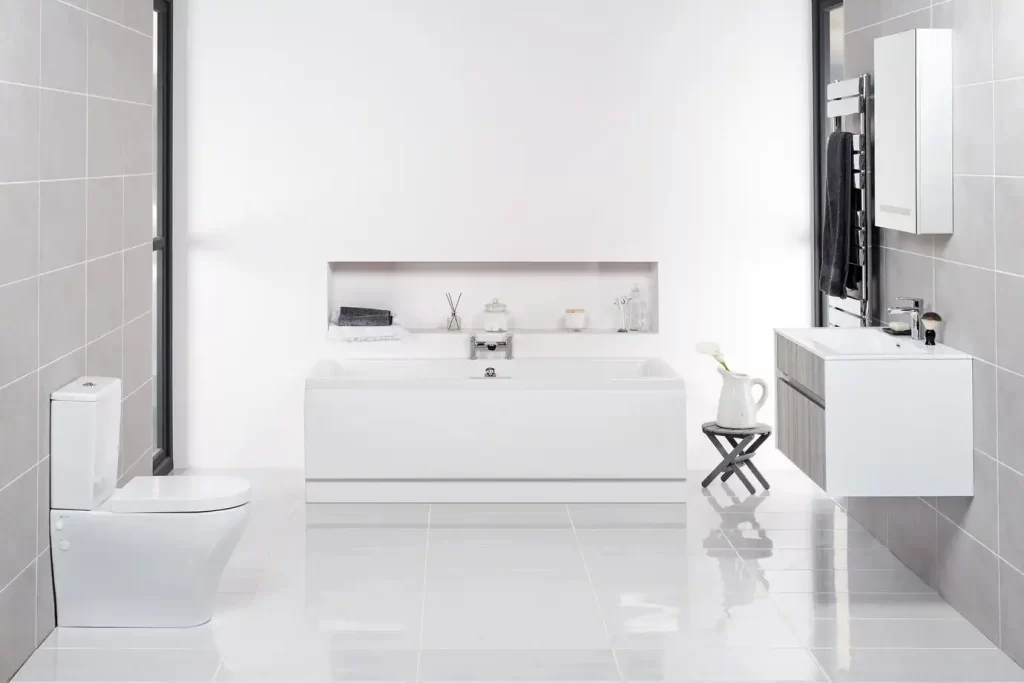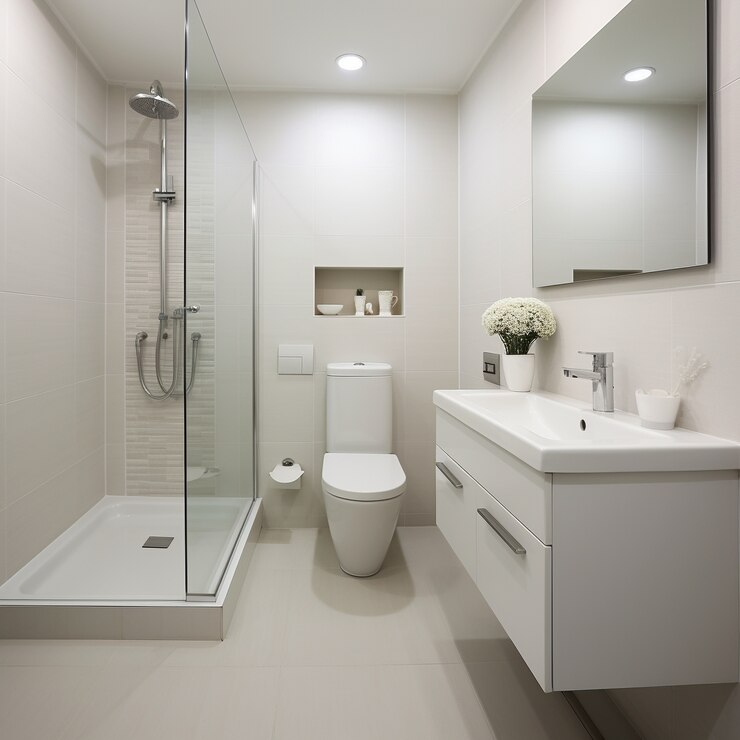The Secret To a Successful Bathroom Renovation In Dubai
Renovating your bathroom in Dubai? It’s one of those projects that seems simple—until you’re knee-deep in tile samples, approval papers, and plumbing quotes. But with a bit of planning, the right team, and smart design choices, your bathroom can become one of the most luxurious, functional spaces in your home.
In this guide, we’ll walk you through the latest trends, common challenges, and expert tips to ensure your bathroom renovation is smooth, stylish, and Dubai-ready.
1. Why Renovating a Bathroom in Dubai Is Unique
Bathrooms in Dubai homes aren’t just practical—they’re often miniature spas. But renovating one here comes with its own set of considerations. From the intense humidity to community approvals and material suitability, there’s a lot to think about.
For instance, coastal homes in Palm Jumeirah or Dubai Marina often battle humidity and salt air. That means waterproofing, ventilation, and mold-resistant materials are non-negotiables. Meanwhile, luxury homeowners in Emirates Hills are leaning into spa-inspired designs with rainfall showers, mood lighting, and custom vanities.
So before you start dreaming of freestanding tubs or marble counters, it’s worth understanding the unique challenges of renovating in Dubai.
2. Material Choices: The Building Blocks of Your Bathroom
Let’s be honest: it’s easy to get overwhelmed when choosing tiles, counters, and cabinets. But material choice is one of the biggest factors in how your bathroom looks, feels, and holds up over time.
Popular choices in Dubai include:
- Porcelain or Ceramic Tiles – Ideal for walls and floors. They’re stylish, water-resistant, and easy to clean.
- Quartz or Marble Counters – Quartz is practical and modern, while marble screams luxury. Just remember marble needs sealing.
- Waterproof MDF or Marine-Grade Cabinets – For under-sink storage or custom vanities, especially if your bathroom gets steamy.
Tip: If you live in a high-rise apartment in Business Bay or JLT, opt for lighter tiles and reflective finishes to make smaller bathrooms feel bigger.
3. Lighting: More Than Just a Vanity Mirror
Great lighting can turn an average bathroom into a sanctuary. And in a city like Dubai, where natural light can be harsh (or nonexistent in internal bathrooms), your lighting design matters.
Here’s how to layer it like a pro:
- Ambient Lighting – General overhead lighting that brightens the room.
- Task Lighting – Usually around the mirror to help with makeup, shaving, or skincare.
- Accent Lighting – LED strips in niches, under cabinets, or behind mirrors to add that hotel-bathroom vibe.
Popular upgrades: motion sensor lights, dimmable LED systems, and backlit mirrors for that soft, flattering glow.

4. Ventilation: The Silent Hero
In a humid city like Dubai, poor ventilation is a recipe for mold, odors, and swollen cabinets. But it’s often overlooked.
Here’s what you need to know:
- Always install an exhaust fan—especially in bathrooms without windows.
- Choose humidity sensors that automatically activate ventilation when needed.
- Consider dehumidifying paint or finishes in extra-steamy zones.
Local tip: If you’re doing a renovation in areas like Mirdif or older villas where ACs are central, check if your ducting setup allows for airflow control. You may need to upgrade.
5. Smart Storage: Make Space for Style
Dubai bathrooms tend to be compact—especially in apartments. But smart storage turns clutter into calm.
Clever options include:
- Built-in niches in showers or above toilets
- Wall-mounted vanities with drawers
- Tall mirror cabinets with LED lighting
- Floating shelves with decorative baskets
Custom joinery is a growing trend. Many Creative Home clients request integrated makeup stations or storage benches under windows.

6. Approvals, Timelines & Local Contractors
Don’t underestimate paperwork in Dubai. Most communities require renovation approvals—even for bathroom work.
Here’s a basic checklist:
- Obtain NOC (No Objection Certificate) from your building management
- Submit drawings and plans if plumbing, electrical, or structural changes are involved
- Choose licensed contractors who understand community regulations (like those from Emaar, Nakheel, or DLD)
Typical renovation time? 2 to 4 weeks, depending on scope. But always add buffer time for permits and delivery delays.
Creative Home tip: We manage approvals, supplier coordination, and full fit-outs—so you don’t have to chase every contractor.
7. What Does a Bathroom Renovation Cost in Dubai?
Costs vary widely depending on size, material quality, and scope. Costing can range from 40,000 aed depending on scale of work, materials, textures, features, fittings etc.
Pro Tip: Always set aside a 10–15% buffer for contingencies like tile shortages, plumbing upgrades, or extra waterproofing.
8. Spa-Inspired Touches to Consider
If you’re dreaming of a bathroom that feels like a private retreat, here are some popular splurges in Dubai:
- Rainfall or dual shower heads
- Aromatherapy diffusers or built-in scent systems
- Underfloor heating (yes, even in Dubai—great for cooler months)
- Smart toilets with bidet features
- Speakers or integrated sound systems
We’re seeing a rise in all-white or neutral bathrooms with gold or black accents for that timeless look.
9. Common Mistakes to Avoid
- Choosing aesthetics over practicality (white grout in a humid bathroom? No thanks)
- Not hiring licensed tradesmen
- Forgetting future resale impact—keep fixtures universally appealing
- Cutting corners on waterproofing (trust us, you’ll pay for it later)
10. Ready to Renovate? Let’s Talk
Whether you’re upgrading a powder room or designing a master ensuite from scratch, Creative Home is here to help you every step of the way—from design concepts and material selection to approvals and turnkey execution.
👉 Explore all our renovation services.
📍 Visit our showroom.
📞Contact us to schedule a free site visit.
FAQ'S
How long does it take to renovate a bathroom in Dubai?
A typical bathroom renovation takes around 4 to 6 weeks, depending on the scope of work. If you’re changing layouts or moving plumbing and electrical systems, this may take longer. Also factor in additional time for building approvals, especially in apartments. Renovation timelines may also be impacted by summer working hours and villa vs apartment regulations.
Do I need approval to renovate a bathroom in Dubai?
Yes. Most communities in Dubai—including Emaar, Nakheel, and private towers—require permits for plumbing, waterproofing, and electrical changes. Your contractor should manage this process, but always double-check that proper approvals are obtained before work begins.
What are the best materials for bathroom flooring in Dubai?
Porcelain tiles are the top choice for bathroom flooring in Dubai—they’re durable, water-resistant, and available in a wide range of styles. For a luxurious touch, natural stone like marble can be used with proper sealing. Avoid wood or laminate unless it’s engineered and waterproofed.
Can I live in my home during a bathroom renovation?
Yes, but expect some disruption. If your home has more than one bathroom, it’s manageable. For single-bathroom homes, consider staying elsewhere during waterproofing and tiling phases to avoid dust and water shutoffs.
LET’S TALK
Find Us
AB Center, Al Barsha
6th Floor, Showroom 610
Mon – Sat: 9am to 6pm
COPYRIGHT © 2025 Creative Home Building Contracting L.L.C
